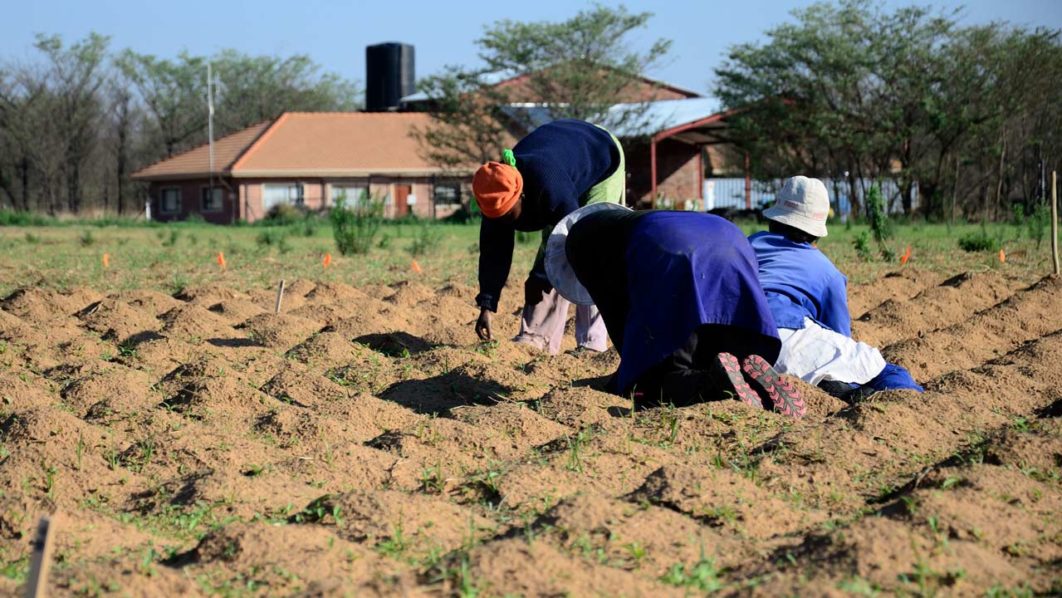
Reported abandonment of food production by farmers in the North East is unfortunate and should not be taken lightly by the authorities. The development is not unconnected with the raging brutal Boko Haram war in the region. The people who used to produce enough food to eat and sell to other parts of the country are now beggars, famished in refugee camps.
The development is double jeopardy for the weary folks, majority of who now depend on food handouts in Internally Displaced Persons (IDP) camps. This, alone, creates more despair among the populace as the attacks persist and succour appears not to be in sight. Is there a way out in what appears to be a desperate situation?
According to reports, no fewer than 78,000 farmers in Borno, Katsina, Taraba, Plateau and other states in the north have abandoned their farmland as a result of attacks by Boko Haram terrorists, bandits and herdsmen.
Consequently, about 56,000 Internally Displaced Household (IDH) farmers from 28 communities in Borno State, who used to cultivate about 95,000 metric tonnes of crops yearly, have lost no less than 504,000 metric tonnes of food since 2015.
Before their displacement, the farmers engaged in wet and dry season farming and fishing; cultivated no fewer than 56,000 hectares of land and got an average of 1.5 metric tonnes of grains per hectare. But since 2015, they have consistently lost their produce to Boko Haram insurgents.
According to reports, the total number of farmers in 56,000 displaced Borno households is about 1.5 million people, currently taking refuge at 24 Internally Displaced Persons (IDPs) camps.
Some of the camps are in Monguno, Damboa, Gwoza, Pulka, Dikwa and Gambouru, a border community with Cameroon, Bakassi, Gubio and Dalori in Maiduguri metropolis, with IDPs coming from the affected 18 local government areas of the state.
The six-year losses of sorghum, maize, beans and groundnuts have reportedly depleted the food basket of the country and incomes of the displaced farmers.
Expectedly, the affected farmers are bemoaning their misfortune. Abubakar Sugun, a 52-year-old farmer from Kukawa Local Government Area taking refuge at Gubio IDP camp, lamented, “Boko Haram insurgents not only killed my relations and friends, they torched our houses and farmlands with crops yet to be harvested.
“We had to flee for safety in 2014 with my wife and five children to Maiduguri IDPs camp.”
He decried that he could not go back to Kukawa to cultivate his eight-acre (approximately 2.5 hectares) farmland. Before he fled to Maiduguri, he had produced millet, maize and beans to feed his family and to sell.
At the Bakassi IDP camp, Fadmatu Musa, another farmer from Gwoza and mother of seven children, said, before insurgency begun in 2013, she produced 24 bags of groundnuts, beans and sesame seeds from seven acres of farmland but had been frustrated by insurgency.
While lamenting his loss, Abubakar Musa, 59, an IDP from Pulka, a border community with Cameroon, said for the six years spent in Bakassi camp, he could have produced over 240 bags (24 tonnes) of sorghum, beans and groundnuts.
He said each year, before the insurgency commenced in August 2014, he produced 40 bags of beans, groundnuts and sorghum from 10 acres of farmland.
The Bakassi Camp Manager, Ibrahim Salihu, said there were 6,664 male household farmers and 13, 464 female household farmers. The displaced farmers are from Marte, Monguno, Nganzai, Guzamala and Gwoza Local Government Areas.
While the Manager, Gubio IDP camp, Musa Sembe, stated he had a record of 16,600 household farmers displaced from Gubio, Bama, Ngala, Kala/Balge, Marte, Gwoza, Kukawa, Konduga, Abadam and Monguno; Dalori IDP Camp Manager, Babagana Baba, said about 20,000 displaced farmers from Bama and Monguno councils and Baga town had yet to return to their communities.
In Taraba State, there are over 16,000 farmers in various camps, while others are taking refuge in host communities.
In Taraba, their dream of beating last year’s record in rice production had been frustrated since “over 80 per cent of farmers have been displaced, according to recent statistics.
In Katsina State, the State Emergency Management Agency (SEMA) indicates that the state has two IDP camps, one in Faskari and the other in Batsari local government areas. The Faskari camp has 2,640 people, while the Batsari camp has 2,480 people. The prolonged insecurity has affected farming activities, especially in the frontline council areas.
Meanwhile, there appears to be no succour in sight for farmers in the Bassa Local Council Area of Plateau State as over 200 women have become widows; over 400 children have become orphans and over 1,000 displaced.
It is estimated that no fewer than 70,000 hectares of arable farmland have been abandoned in the affected states and local government areas. These challenges, experts say pose serious threats to food sufficiency in Nigeria.
There is no doubt that the Boko Haram war has dealt a big blow on food production in the North East.
The North East is at the centre of the 10-year bloody insurgency that has claimed thousands of lives and devastated the area. Borno State is the epicentre, while Yobe and Adamawa states have also been ravaged.
It is trite to say that wars hardly end in the battlefield but on the negotiating table. The people are weary and want an end to the war. Government should continue to seek for dialogue to engage the insurgents.
Besides, government should use whatever possible means within its power to end the crisis. In truth, government may claim to be doing its best but their best hasn’t been good enough for the people in IDPs. But now the consequences may be more devastating when food insecurity worsens.






